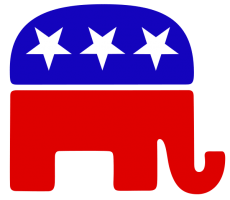
Marijuana legalization has been making inroads with Republican voters, especially millennials, but GOP support has lagged well behind Democrats and independents. Cannabis law reform advocates have long pointed out the conservative values demonstrated by marijuana legalization, including personal freedom, personal responsibility, entrepreneurship, smaller government and states’ rights. Marijuana law reform has split prominent Republicans, some who are already running for president, others contemplating a 2016 run. While not fully embracing legalization like his father, Senator Rand Paul has expressed support for medical cannabis and states’ rights to choose their own policies while New Jersey Governor Chris Christie has pledged to use federal forces to shut down states’ regulated marijuana systems.
The Los Angeles Times reports that GOP candidates opposing legalization are facing a dilemma as they “are running against the tide of opinion in the country overall, a conundrum the party faces on a host of social issues, including same-sex marriage.”
In a recent Pew Research Center survey, 53% of Americans polled said they supported legalizing marijuana, compared with 44% who were opposed. The political divide was stark. Only 39% of Republicans favored legalization, compared with 59% of Democrats and 58% of independents.
Still, there was some nuance among Republicans: When asked whether the federal government should enforce its anti-pot laws in states that allowed marijuana use, 54% said it should not, while 43% said the government should enforce federal marijuana laws.
That result points to one of the central dilemmas confronting the party’s voters and candidates on the issue of marijuana: They favor a weaker federal government and giving more power to the states in general, but when it comes to pot, a substantial bloc of the party wants the federal government to rein in the states.
As The Los Angeles Times notes, cannabis policy is a major dilemna for Republican candidates as they seek the GOP’s 2016 presidential nomination. The candidates have to cobble together a winning coalition that includes fundamentalists, conservatives, moderates, business interests and libertarians. With several marijuana ballot measures expected on the ballot, it will be very unpopular for any candidate to proclaim that they will use federal resources to override the will of the voters who choose to legalize marijuana, medical and/or recreational.
While Republicans may write off the West Coast, they certainly don’t want to upset the swing voters in Colorado or states that may have marijuana measures on the ballot in 2016, such as Nevada, Missouri, Ohio and Florida. Republicans would be wise to at least adhere to a states’ rights point of view on the issue, although some Republicans may want to consider not ceding the more libertarian position to Rand Paul. It will certainly be interesting to watch and the cannabis community will certainly be paying attention and will be organizing, voting and donating accordingly.






